LAHORE: Pakistan’s top court on Monday commuted the death sentence of a convict who had spent 23 years on death row, after determining he had committed the crime while still a minor, his defense lawyer said.
The Supreme Court's ruling was hailed by Justice Project Pakistan, a rights group that fought the years-long legal battle for Muhammad Anwar.
Anwar was arrested in 1993, after police accused him of participating in an attack that killed a villager. He was sentenced to death in 1998. He was 17 years old at the time of the attack, said the lawyer, Zainab Mahboob, expressing hope that Anwar will be released soon.
The court ruled the time spent in prison will be considered as served sentence, Mahboob added. She added that Anwar while in prison, had suffered three heart attacks since 2013.
Under Pakistani law, inmates are freed if they have already spent more than 14 years behind bars after being convicted and sentenced in a murder case.
Barrister Sarah Belal, executive director of Justice Project Pakistan, welcomed the development, saying “Pakistan has steadily been taking steps to ensure the fulfillment of its obligations under the International Covenant on Civil and Political Rights and the Convention on the Rights of the Child."
Last year, another court had commuted the death sentence of Muhammad Iqbal, who spent over 20 years on death row for a crime committed as a minor. “This, however, begs the question why children are being sentenced to death anyway when all local and international laws expressly prohibit it," Bilal said.
Pakistan halted executions between 2008 and 2014 due to pressure from international human rights groups but lifted the moratorium following a Taliban attack on a school in Peshawar in December 2014 that killed 150 people, nearly all of them children.
Since then, Pakistan has executed 515 inmates. More than 4,200 are still on death row at prisons in the country.
Pakistani court commutes death sentence, after 23 years
https://arab.news/4gaxb
Pakistani court commutes death sentence, after 23 years
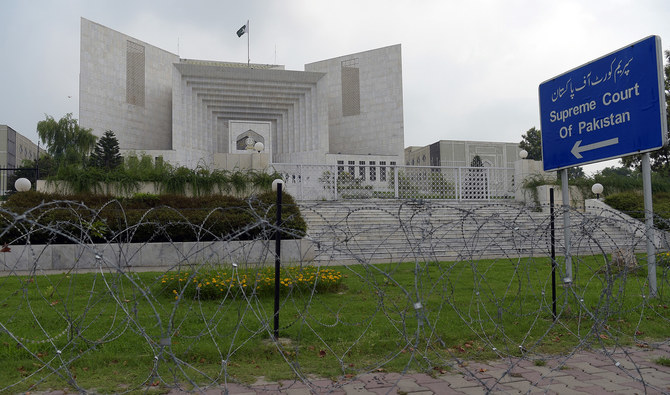
- Court said the convict had committed the crime while still a minor, he was sentenced to death in 1998
- Anwar was arrested in 1993, after police accused him of participating in an attack that killed a villager
Pakistan’s PM Sharif to kick off World Economic Forum engagements in Riyadh today

- PM Shehbaz Sharif is in Riyadh to attend two-day World Economic Forum meeting on global growth and energy
- Sharif to meet Saudi leadership, world leaders and heads of international organizations during conference
ISLAMABAD: Prime Minister Shehbaz Sharif and his delegation will kick off their World Economic Forum engagements in Riyadh today, Sunday, as they gear up to present Pakistan’s priorities on key issues such as global health, energy and economic growth, his office said.
Sharif arrived in Riyadh on Saturday to attend a two-day WEF meeting on global collaboration, growth and energy, which will be held in the Saudi capital from April 28-29.
The prime minister was extended an invitation to attend the meeting by Crown Prince Mohammed bin Salman and Professor Klaus Schwab, the WEF executive chairman.
“PM Shehbaz Sharif and his delegation will present Pakistan’s priorities in global health, fintech, climate change, inclusive energy and rejuvenating growth,” the Prime Minister’s Office (PMO) said in a statement on social media platform X.
It added Sharif would meet the Saudi leadership, world leaders, heads of international organizations and prominent figures during his stay in the country.
“Look forward to important discussions on pressing challenges of our times,” the Pakistani prime minister posted from his X account separately on Sunday.
Prior to Sharif’s departure, the PM Office said he would be accompanied by Foreign Minister Ishaq Dar and Finance Minister Muhammad Aurangzeb.
It said Sharif’s participation in the forum will afford Pakistan an opportunity to highlight its priorities in global health architecture, inclusive growth, revitalizing regional collaboration, and the need for striking a balance between promoting growth and energy consumption.
The prime minister will also attend the 15th session of the Islamic Summit Conference organized by the Organization of Islamic Cooperation (OIC) on May 4-5 in the Gambian capital of Banjul to discuss a variety of regional and global issues, including Palestine, Islamophobia, climate change and the status of minorities, the Pakistani state-run APP news agency reported.
The session will be held under the slogan “Enhancing Unity and Solidarity through Dialogue for Sustainable Development,” according to a press release issued by the OIC General Secretariat.
The Islamic Summit is a principal organ of the OIC focused on the formulation, development, and implementation of decisions made by 57 member states. It is attended by concerned heads of state such as prime ministers, presidents, emirs and other equivalent heads.
Security forces kill one militant, injure another in Pakistan’s southwestern Balochistan
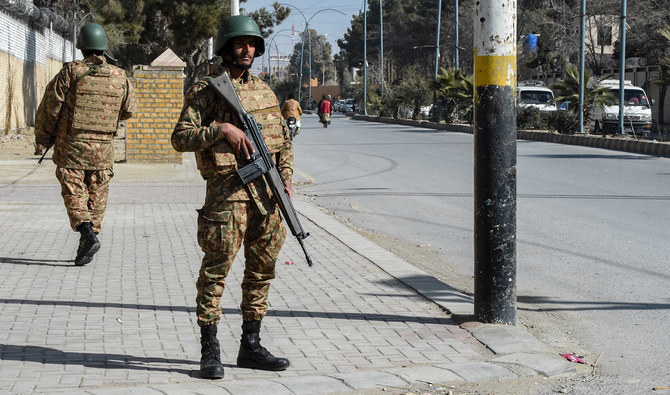
- The operation was carried out while militants were trying to stop passenger vehicles in Harnai district
- Baloch militants killed nine migrant laborers from Punjab in March after stopping a bus in Noshki
ISLAMABAD: Security forces in Pakistan killed one militant and injured another in the country’s southwestern Balochistan province, said the military’s media wing, ISPR, on Saturday, while they were trying to stop passenger vehicles in Harnai district.
Earlier this month, armed assailants intercepted a bus traveling from Quetta to Taftan near the city of Noshki, singling out nine passengers, who were later identified as migrant laborers from Punjab province, and shot them.
Balochistan’s Harnai district has also witnessed militant violence, with an improvised explosive device killing one employee of Mari Petroleum and injuring 14 others in March 30.
“On 27 April 24, a fire exchange took place between security forces and terrorists in Harnai District of Balochistan,” the ISPR said. “The terrorists tried to stop passenger vehicles plying on Sanjavi Road, Harnai. Security Forces reacted immediately and effectively engaged the terrorists.”
The statement mentioned that one militant was killed and another injured during the fire exchange.
“The timely response by the security forces thwarted nefarious intent of the terrorists, saving innocent lives,” the statement added. “Sanitization operation is being carried out to eliminate any terrorists found in the area.”
Balochistan has long been the scene of a low-level insurgency by separatist groups who accuse the state of denying the people of the province of their share in its vast mineral wealth.
The government has frequently denied the allegation, saying it is carrying out a number of development projects for the prosperity of Baloch nationals.
Pakistan says net-metering promotes ‘unhealthy investments’ in solar power
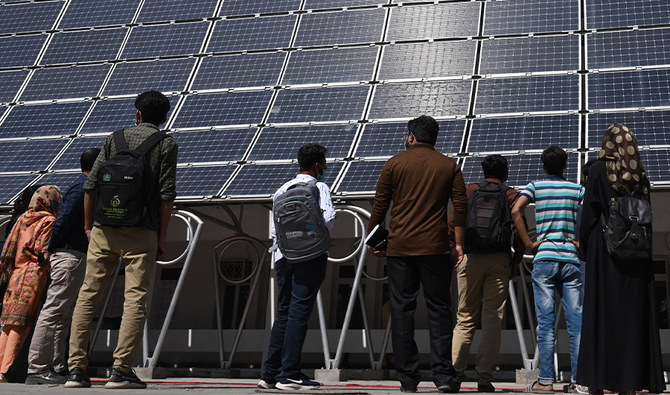
- Government says massive solar installation is affecting 30 million consumers, imposing Rs1.90 per unit burden on them
- Experts say the government’s ‘regressive policies’ will make it difficult to cut fossil fuel and promote renewable energy
ISLAMABAD: The Pakistan government said on Saturday net-metering was promoting unhealthy investments in installation of solar power by affluent domestic and industrial consumers, hinting at cutting the buyback rates to discourage uptick in the sector.
The government approved the net-metering policy in 2017, allowing solar panel purchasers to sell power they produced to the national grid to spur the solar energy use and cut power shortages. Under the policy, the government is paying Rs21 per unit for the net-metered electricity which the government says is resulting in the subsidy of Rs1.90 per unit, burdening the government.
This development comes at a time when the price of solar panels has plummeted by more than 60 percent in Pakistan in recent weeks due to the bulk imports from China because of lower rates, making the country witness a surge in the solar power installation by domestic and industrial consumers to reduce their electricity bills.
“The present system of net-metering is promoting unhealthy investments in solar power,” the energy ministry said in a statement on Saturday. “Affluent consumers have been massively installing solar power due to which domestic, industrial consumers and the government have to bear the burden of Rs 1.90 per unit under the head of subsidy.”
The ministry warned the subsidy was affecting some 25 to 30 million “poor consumers,” and if the trend of the solar power continued, the bills of ordinary consumers would surge by at least Rs 3.35 per unit. However, it clarified no fixed tax was being imposed on the solar power.
The 2017 net-metering policy was aimed at promoting renewable energy in the system, which helped enhance the solarization in the country that now “needs to be balanced,” the ministry said.
Pakistan has ideal climatic conditions for solar power generation, with over nine hours of sunlight in most parts of the country. Utilizing just 0.071 percent of the country’s area for solar photovoltaic (solar PV) power generation would meet Pakistan’s electricity demand, according to the World Bank.
Currently, only 5.4 percent of Pakistan’s installed power generation capacity of 39,772 megawatts comes from renewables like wind, solar and biomass, while fossil fuels still make up 63 percent of the fuel mix, followed by hydropower at 25 percent, according to the National Electric Power Regulatory Authority (NEPRA).
The South Asian nation of 241 million aims to shift to 60 percent renewable energy by 2030 with 50 percent reduction in projected emissions, but it stands far behind in meeting the goal despite a recent surge in the solar power.
Energy experts said the government’s “inconsistent” solar power policies would result in discouraging the sector and its failure in meeting the national and international commitments of cutting the greenhouse gas emissions.
“Public sector the world over is promoting renewable energy to cut fossil fuel while we are discouraging consumers with regressive policies,” Aamir Hussain, chairman of Pakistan Alternative Energy Association, told Arab News.
He said the association had suggested the government to issue licenses to consumers for their actual household or industry load instead of allowing them to install massive solar power with a promise to buyback the surplus.
“The government should come up with an inclusive policy to promote renewable energy instead of discouraging consumers by slapping taxes or cutting the rates,” he added.
Babar Azam and Shaheen Afridi help Pakistan down New Zealand to draw T20I series

- Azam’s 44-ball 69 took Pakistan to 178-5, while Afridi’s 4-30 restricted New Zealand to 169 in 19.2 overs
- The series gave both the teams a kickstart to their preparations for the T20 World Cup in June this year
LAHORE: Skipper Babar Azam hit a solid half century while spearhead Shaheen Shah Afridi grabbed four wickets as Pakistan overcame New Zealand by nine runs in the fifth and final Twenty20 international in Lahore on Saturday.
Azam’s 44-ball 69 and Fakhar Zaman’s 33-ball 43 took Pakistan to 178-5 in their 20 overs before Shaheen claimed 4-30 to restrict New Zealand to 169 in 19.2 overs, squaring the series at 2-2.
But Pakistan’s win only came in the final over with 12 needed as Josh Clarkson 38 not out threatened to pull off a heist, but two run outs in Mohammad Amir’s over sealed the home win much to the delight of a full house at Qaddafi Stadium.
The first match of the series was abandoned while Pakistan clinched the second and New Zealand the third by identical seven-wicket margins – all in Rawalpindi.
New Zealand took the fourth match, also in Lahore, by four runs.
The series gave both the teams a kickstart to their preparations for the Twenty20 World Cup to be held in the United States and the West Indies in June.
While Pakistan would be disappointed not to have won a series against a depleted New Zealand side missing a host of players due to Indian Premier League, unavailability and injuries, the visitors got a boost from their bench strength.

Shaheen gave Pakistan an ideal start by dismissing Tom Blundell for four in his first over – his 15th wicket in his opening over of a Twenty20 international – and 50th in all T20 matches.
Tim Seifert put New Zealand back on track with an aggressive 33-ball 52 – his ninth T20I half century containing seven boundaries and two sixes.
He added 76 for the second wicket with skipper Micheal Bracewell (23) but from 81-1 New Zealand lost four wickets in the space of 25 balls for the addition of just 22 runs.
Leg-spinner Usama Mir (2-21) had Seifert and Mark Chapman (12) while fellow spinner Shadab Khan accounted for Bracewell as New Zealand’s chase was derailed.
Shaheen returned for a second spell to dismiss James Neesham (16), Zak Foulkes (naught) and Ish Sodhi (three) in successive overs.
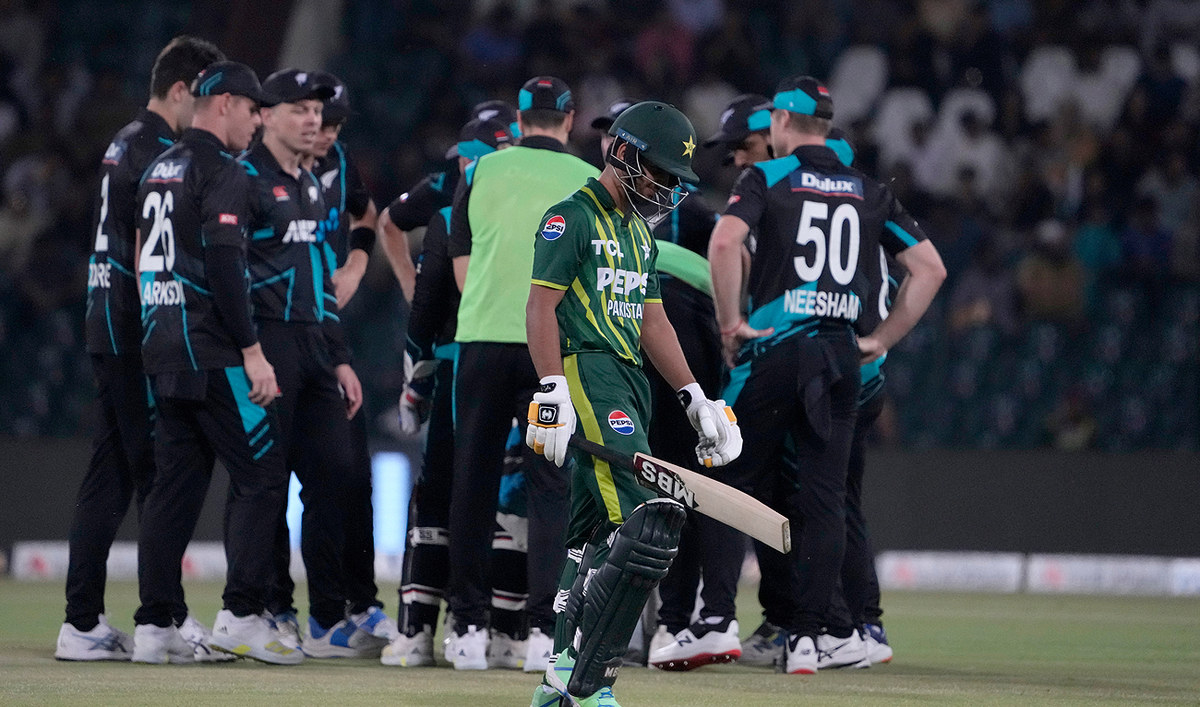
Earlier, Azam saw his opening partner Saim Ayub fall in the second over for just one but that did not deter him as he added 73 for the second wicket with Usman Khan who made a brisk 24-ball 31.
Azam hit six boundaries and two sixes in his 34th T20I half-century before he was bowled by pacer Ben Sears in the 15th over.
Zaman hit four boundaries and a six before he was smartly caught by Chapman on the boundary off Foulkes as Pakistan managed 55 in the last five overs.
Shadab Khan hit a six and a four in his five-ball 15 not out.
New Zealand made three changes as they brought back Seifert, Cole McConchie and Foulkes while pace spearhead Shaheen returned for the home team.
New Zealand win toss, opt to bowl in 5th and final T20 against Pakistan
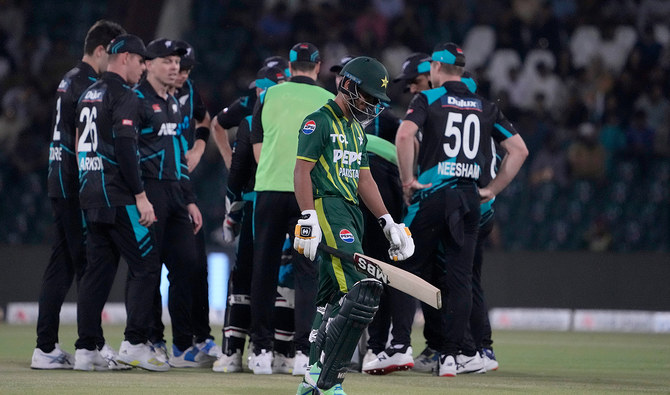
- Pakistan, looking to build-up for June’s T20 World Cup, are trailing 2-1 in the series
- Pakistan have brought in their ace fast bowler Shaheen Shah Afridi in place of Zaman Khan
LAHORE: New Zealand captain Michael Bracewell won the toss and elected to field in the fifth and final Twenty20 against Pakistan on Saturday.
Pakistan, looking to build-up for June’s T20 World Cup, are trailing 2-1 in the series as they tested their bench strength against the understrength Black Caps.
Pakistan made just one change from the team that lost the fourth match by four runs, bringing in their ace fast bowler Shaheen Shah Afridi in place of Zaman Khan.
New Zealand, touring Pakistan without their nine frontline T20 players who are in the Indian Premier League, made three changes.
Tim Seifert recovered from sore back and returns in place of Tim Robinson, who scored a half-century in the last game but was ruled out with a groin injury.
Cole McConchie and Zak Foulkes also made it to the playing XI replacing Dean Foxcroft and Jacob Duffy. Foxcroft was ruled out with a back injury.
The first game was abandoned because of rain before Pakistan bowled out New Zealand for 90 runs in the second game to win by seven wickets.
New Zealand made a comeback, winning the third match by seven wickets before edging out the home team in the last game at Qaddafi Stadium on Thursday.










